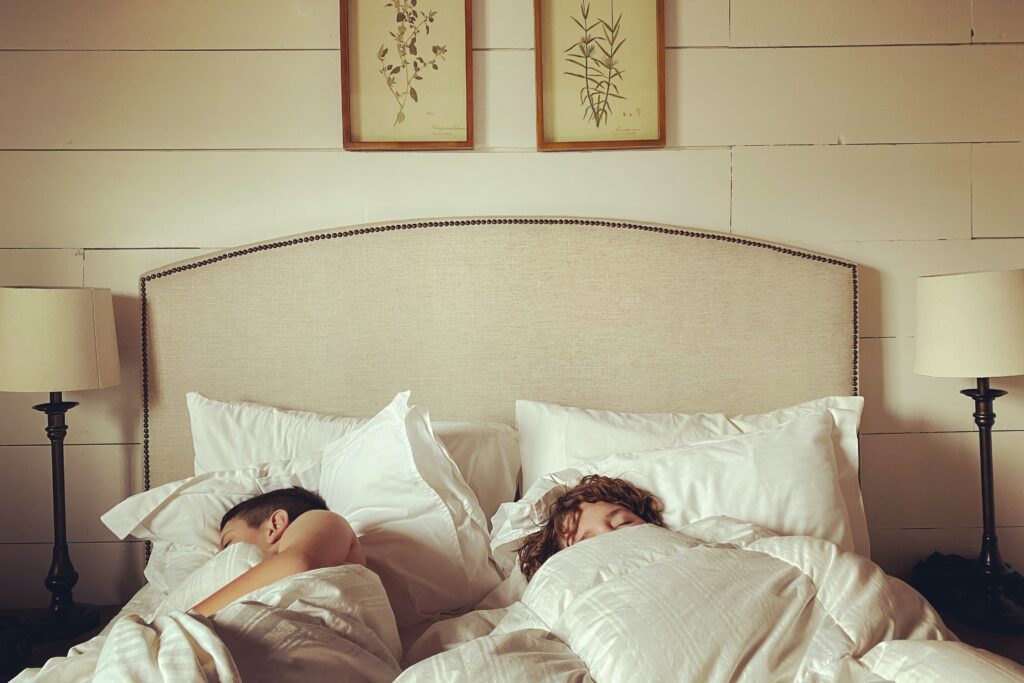If you struggle to get a good night’s sleep or find your mind racing late at night, it can be frustrating, cause daytime tiredness and brain fog. You may be wondering what you can do to get a better night’s sleep.
The good news is there are tried and tested ways to improve your sleep and get to sleep faster, even if it’s just using Loop Sleep Earplugs to block out noise. A good night’s sleep allows you to tackle each day with energy and clarity.
Let’s discover 5 ways to get a better night’s sleep.
Create a Routine and Stick to it!
Have you ever struggled to get to sleep and then wake up in the morning at the same time you would ordinarily wake up?
This is your bodies internal clock at work. If you tend to wake at 7am each morning, your body will try to wake you regardless of how well you slept.
The interesting thing is your body works in the same way with getting to sleep and there will be a time programmed into your internal body clock for sleeping. Of course this clock could have been disrupted, especially if you are going to sleeper later each night.
Resetting Your Body Clock (Circadian Rhythm)
The first tip to get a better night’s sleep is to be regimented at setting a time each night to get into bed – even if you are not tired. Over time your body will become accustomed to that time and program it into your internal body clock.
It may not give you success overnight, but over the course of a few weeks, sticking to a strict sleep schedule will help tremendously. In the meantime, and for some quick fixes, the next four tips to get a better night’s sleep will help you adjust to your new schedule.

Magnesium Supplement – Get a Better Night’s Sleep
Our bodies need all kinds of nutrients and vitamins to function, most of which we get through our diet.
Magnesium is a metal that the body needs to maintain numerous functions including regulating brain activity. Unfortunately it is estimated that 48% of the US population isn’t getting enough magnesium through their diet alone and in Europe and the UK although this figure is lower, it is still high.
First you should work out how much magnesium you are getting in your diet. Magnesium can be found in:
- Legumes
- Nuts
- Seeds
- Leafy Green Veg
You can also find trace elements of Magnesium in many other food types. If you feel you are not getting enough magnesium you should supplement it. It is recommended men get 420mg of magnesium and women get 360mg.
You can choose to achieve this through diet alone or by supplementation. Meeting your daily recommended dose of magnesium has proven to speed up the time it takes to get to sleep and improve sleep quality compared to placebo. You can even take supplements in tea form – see Tea Plus Magnesium Tea.
Chamomile and Lavender Tea – Get a Better Night’s Sleep
If you are still struggling to fall asleep, a warm (non-caffeinated) drink before bed is a good way to settle the body and get you cosy for sleep.
This can be any number of drinks including:
- Hot chocolate,
- Possets (the traditional drink not the dessert),
- Herbal teas,
- Decaffeinated tea or coffee.
Chamomile and lavender tea has long been used as a herbal remedy to induce sleepiness. Currently there isn’t much scientific evidence to support the claim – however there are very few high-quality studies conducted on this to say definitively how well it works.
It is no secret that most tea brands incorporate chamomile and lavender into their sleep inducing teas. At the very least, a chamomile and lavender tea will impart the benefits of a warm drink before bed to relax the body and at best actually help induce sleep.
Get Your 10,000 Steps or Comparable Exercise
Our lifestyles are increasingly sedentary and the majority of people in the UK don’t get enough exercise. The human body is a system that works better when it is used which contrasts drastically with modern lifestyles.
You should aim to exercise daily and get your 10,000 steps a day. Any cardiovascular exercise will improve your heart health and improve circulation. Even non-cardiovascular exercise will help your metabolism as your body converts fat into muscle.
Ultimately, exercise will exert energy, and this will mean your body is quicker to tire. Exert yourself enough and you will find falling asleep at night easy. Your brain won’t have the energy to race with thoughts and will be crying out for much needed rest.
While there is very little science behind the 10,000 step rule, even as an arbitrary figure it will help you exert energy and burn between 300-400 calories extra each day.
Avoid Stimulation from Technology
When we use our phones, gaming systems or TVs our eyes are taking in blue light which is known to stimulate the brain. Even without the blue light our screens emit, technology itself tends to be stimulating in nature.
A good idea is to switch off technology at least half hour before bed. Use that half hour to brush your teeth, have a quick wash and grab that warm drink we mentioned above – creating a solid sleep routine is key. Then climb into bed and get a better night’s sleep!
